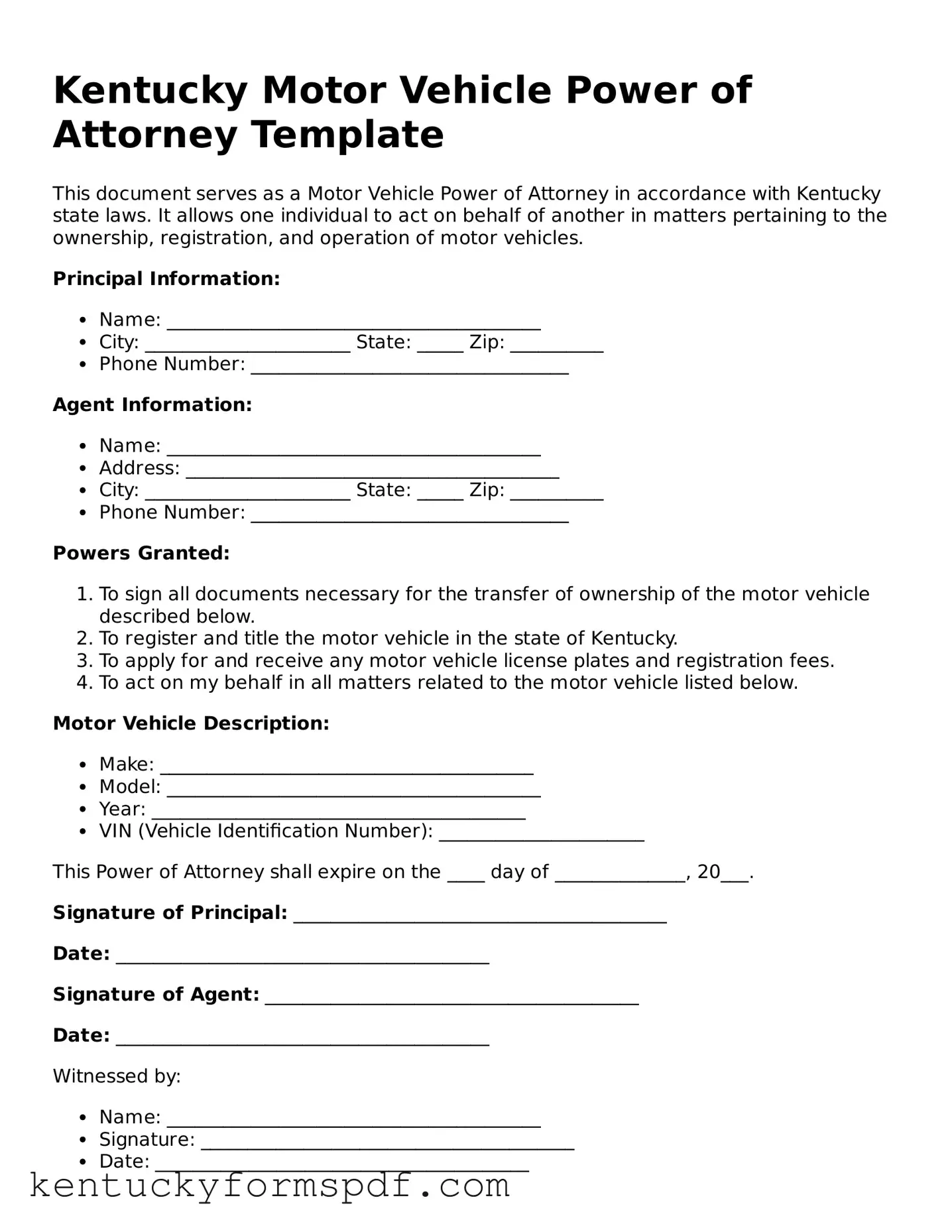The Kentucky Motor Vehicle Power of Attorney form shares similarities with the General Power of Attorney. Both documents allow individuals to grant authority to another person to act on their behalf. This can include making decisions regarding financial matters, property transactions, or legal actions. The key difference lies in the scope; while the General Power of Attorney covers a wide range of powers, the Motor Vehicle Power of Attorney is specifically focused on matters related to motor vehicles, such as registration and title transfers.
Another document that resembles the Kentucky Motor Vehicle Power of Attorney is the Durable Power of Attorney. This type of power of attorney remains effective even if the person granting it becomes incapacitated. Like the Motor Vehicle Power of Attorney, it allows the designated agent to handle specific tasks. However, the Durable Power of Attorney can cover a broader array of decisions beyond just vehicle-related issues, including healthcare and financial matters.
The Limited Power of Attorney is also comparable to the Kentucky Motor Vehicle Power of Attorney. This document grants authority for a specific task or for a limited period. For example, an individual may use a Limited Power of Attorney to allow someone to sell a vehicle on their behalf. The Motor Vehicle Power of Attorney is a type of Limited Power of Attorney, as it is restricted to vehicle-related transactions.
The Vehicle Title Application is another document that is related. While it does not grant power of attorney, it is often used in conjunction with the Motor Vehicle Power of Attorney. The Vehicle Title Application is necessary for registering a vehicle and transferring ownership. When an agent is appointed through the Motor Vehicle Power of Attorney, they may need to complete this application to finalize the vehicle transfer.
The Bill of Sale is similar in that it is often used during the sale or transfer of a vehicle. While the Motor Vehicle Power of Attorney allows someone to act on behalf of another person, the Bill of Sale serves as a record of the transaction. Both documents are crucial in the process of transferring vehicle ownership, but they serve different purposes within that process.
The Release of Liability form also has a connection to the Motor Vehicle Power of Attorney. When a vehicle is sold, the seller may need to submit a Release of Liability to inform the state that they are no longer responsible for the vehicle. If the seller has granted power of attorney to someone else, that person may need to complete this form as part of the transaction process.
The Affidavit of Heirship can be relevant when dealing with vehicle ownership after someone has passed away. This document helps establish the rightful heirs to a deceased person's assets, including vehicles. If an heir has been granted a Motor Vehicle Power of Attorney, they can manage the vehicle's title and registration based on the authority given to them.
The Vehicle Registration form is another document that complements the Motor Vehicle Power of Attorney. When a vehicle is transferred, the new owner must register it with the state. If an individual has designated someone to act on their behalf through the power of attorney, that person can complete the Vehicle Registration form and submit it to the relevant authorities.
The Odometer Disclosure Statement is also related to the Motor Vehicle Power of Attorney. This document is required during the sale of a vehicle to disclose the mileage. If an agent is acting on behalf of the seller, they will need to complete this statement as part of the vehicle transfer process. Both documents are essential for ensuring compliance with state regulations.
For those seeking to establish a clear framework for their business, a thorough understanding of an Illinois Operating Agreement template is essential. This valuable document delineates the management structure and operational procedures for limited liability companies (LLCs), ensuring that all members are aligned on their roles and responsibilities.
Lastly, the Insurance Policy Transfer form can be associated with the Motor Vehicle Power of Attorney. When ownership of a vehicle changes, the insurance policy must also be updated. The designated agent may need to complete this form to transfer the insurance coverage to the new owner. This ensures that the vehicle remains insured under the new owner's name, making it a crucial step in the transfer process.

